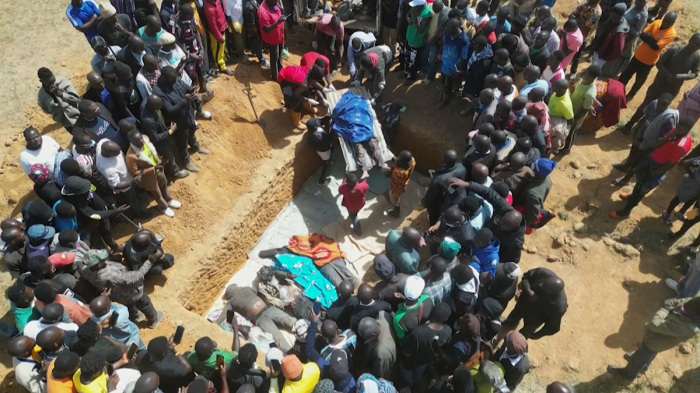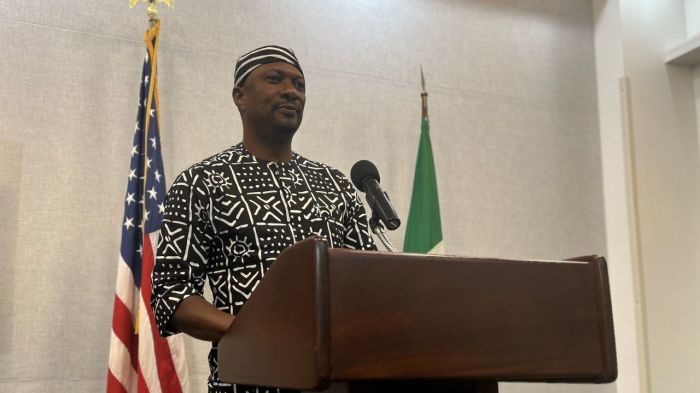
WASHINGTON — Barr Franc Utoo, a native of Nigeria’s Benue state and a graduate student at the University of Central Oklahoma, awoke to several missed calls one morning last month.
Fulani terrorists murdered 34 members of his immediate family during the June 13-14 Yelewata Massacre, including his pregnant aunt, by slicing open her belly and removing her twin unborn children.
The extremists attacked the Christian community of Yelewata in the Guma Local Government Area of Benue, slaughtering more than 200 believers in what has been described as one of the deadliest assaults in the region’s ongoing violence that has claimed the lives of countless Christians.
“The first names that I asked after spontaneously, they were all killed,” Utoo, who was in Oklahoma at the time, told attendees during a Thursday press conference hosted by Equipping The Persecuted, an organization dedicated to reporting on Nigerian Christian persecution and enhancing villages’ security.

The extremists who carried out the massacre “butchered” his aunt, he said, who had been pregnant with twins at the time of her death. The radicals pierced her belly and removed the twins, killing Utoo’s aunt and her unborn children.
The Nigerian, who comes from a family of Catholics, also said his sister was killed during the massacre. Utoo said his sister, a devout Catholic and an altar server, had her brain “peeled out.”
One of Utoo’s friends, who had just graduated after studying pharmacy for seven years, arrived at the village on the same day that the killing began. The Fulani terrorists killed Utoo’s friend by burning him to death in his room during their rampage, where they torched buildings and burned people alive.
As Utoo noted, the village is “sandwiched” by two state capitals and is located near several military bases. However, the attack lasted around four hours without interruption. The Yelewata native believes this is a sign of what he calls the Nigerian government’s complicity in Christian persecution.
A May intelligence memo from Nigeria’s Department of State Security reportedly even foreshadowed a planned assault by Fulani militias in Benue communities such as Yelewata. However, the Nigerian military provided no defense to Yelewata.
“The Nigerian government, despite its pronouncement, has demonstrably failed to defend us,” Utoo said. “Time and again, when our villages are attacked, help is either non-existent or deliberately arrives too late.”
“Worse, when our young men, driven by desperation to protect their families, organize themselves in self-defense, they are often met not with support, but with arrest and detention by the very authorities who should be protecting them, leaving our communities even more vulnerable.”
“This is not just neglect,” Utoo asserted. “It is an active disarming of the victims.”
Advocates have spoken out for years on the rising trend of what they say are genocide-like attacks on predominantly Christian farming communities in Nigeria’s Middle Belt states carried out by armed and radicalized Fulani militias. Thousands have been killed in recent years, and many more have been displaced from their communities and farms.
Christian persecution watchdog organizations like Open Doors and ADF International note that more Christians are being killed in Nigeria each year than in all other countries combined.
Local leaders have pushed back on the Nigerian government’s narrative that increasing attacks are part of decades-old farmer-herder clashes and not sectarian violence.
Last month, James Ortese Iorzua Ayatse, paramount ruler of the Tiv tribe, said during an event attended by President Bola Ahmed Tinubu that attacks like the one in Yelwata are not communal conflicts.
“It’s not herders-farmers clashes, not communal clashes or reprisal attacks,” Ayatse said, according to outlet TruthNigeria. “It is a calculated, well-planned, full-scale genocidal invasion and land-grabbing campaign by herder terrorists and bandits.”
Pope Leo XIV acknowledged the Yelwata attack, saying in an Angelus message he is praying for those killed in “a terrible massacre,” most of whom were “sheltered by the local Catholic mission.” Leo prayed for “rural Christian communities of the Benue State who have been relentless victims of violence.”
In 2020, the U.S. government added Nigeria to the Countries of Particular Concern list during the final year of President Donald Trump’s first term. During the first year of the Biden administration, the State Department removed Nigeria’s CPC label to the dismay of the U.S. Commission on International Religious Freedom. There is some hope that Nigeria could be re-added to the CPC list with Trump back in the White House.
Utoo shared several recommendations that he believes will protect Nigerian Christians from persecution and genocide. He called on the U.S State Department to redesignate Nigeria as a CPC and called for the prosecution of terrorist sponsors through the International Criminal Court “for crimes against humanity.” The sponsors of Fulani extremists, according to Utoo, are well-known to the United States and Nigeria.
“This is not merely about justice for the past; it is also about dismantling the machinery of terror that continues to threaten our existence,” Utoo said.
“My people are resilient, we are resourceful, but we are also systematically slaughtered,” he added. “We are not asking for an army to fight our battles, but for the right to protect our lives, our families and our faith in the face of an existential threat.”
“The price of continued inaction, of polite diplomacy that ignores the brutal reality on the ground, will be paid in Christian blood,” the Yelewata native warned.
Samantha Kamman is a reporter for The Christian Post. She can be reached at: samantha.kamman@christianpost.com. Follow her on Twitter: @Samantha_Kamman


















